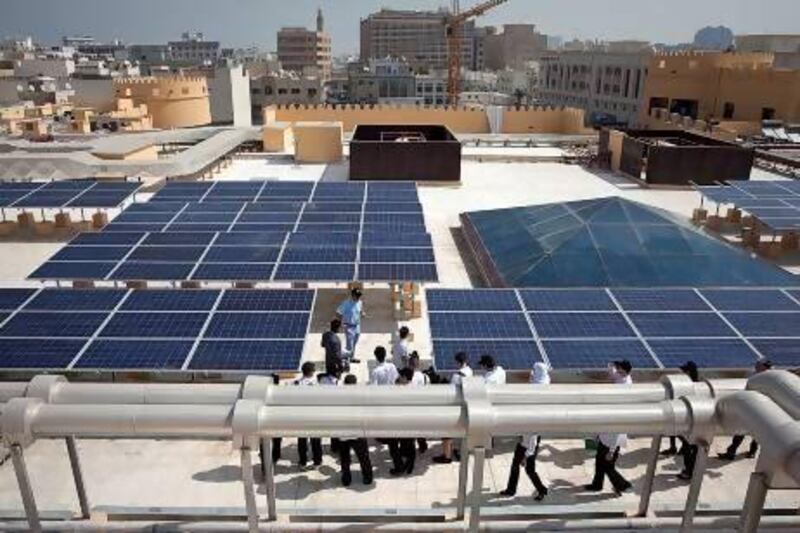Outreach scheme allows 15 teenagers to tour the new system in Fahidi market that converts sunlight into electricity, and an energy-saving hot-water project
A group of students are among the first people to get a first look at Dubai's Fahidi Market.
But rather than explore the corridors of the traditional-style souq, the 15 pupils from Jumeirah Baccalaureate School headed straight to the roof.
The objects of their curiosity were two rooftop installations capable of producing electricity and hot water using the power of the sun.
Covering 340 square metres, the solar photovoltaic (PV) system captures sunlight and converts it into electricity. Some panels are connected to large batteries and used to power lights in the building.
"The electricity is generated during the day and used at night," said Ragunath J, director of Value Addition, the company that installed the system.
The other panels produce electricity and feed it into Dubai's energy grid. The system has a capacity of 50 kilowatts, 10 of which supply energy for the building's lighting, with the rest fed into the grid.
"We started the project in March and the system has been working since April," he said.
Rather than relying on sunlight, a solar hot-water system captures the sun's heat, explained Suresh Perera, manager at Solair Solar Energy Systems, the company that installed it.
It will produce 15,000 litres of hot water a day - enough to supply 33 cafes and a large restaurant in the market that is due to open soon.
When it comes to solar technologies, hot-water systems are the most affordable solution and offer quick gains, Mr Perera said.
"If correctly sized, a solar hot-water system can give 90 to 95 per cent energy saving," he said.
The students' visit this week was part of an education and community outreach scheme by the Emirates Solar Industry Association (Esia).
They approached the school through a pupil, Abhinav Das, 15, who chose solar power as the topic of a year-long school project and ended up producing an in-depth study of the UAE's solar market that impressed experts.
The teenager did not know much about solar energy before he started but had always wondered why more was not being done to harness the power of the sun.
Abhinav said the visit meant a lot to him. "I enjoyed sharing this with my classmates and learning more about it," he said.
More school visits are to follow, said Vahid Fotuhi, Esia president.
"Part of our mandate is to increase awareness at all levels of society," he said, adding it was particularly important to work with young people," Mr Fotuhi said.
"If we start early we can plant the seeds of possibility for these children so they realise how feasible solar is, so they can be ambassadors for it."





